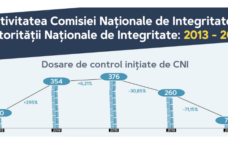The National Integrity Commission (NIC) was set up in 2012 to check the integrity of civil servants and persons of public dignity and to prevent corruption by verifying the wealth of these persons. In 2016, the institution was reorganized into the National Integrity Authority (NIA).
From 2013 until 2017, NIC initiated 1,185 control files and issued 398 decisions of various violations. Most violations relate to the declaration of assets and property (42%) and to the existence of conflicts of interest (41%). 49 files which request the decisions annulment were examined by the Supreme Court of Justice (SCJ). Out of the 49 files for the period 2013-2017, the SCJ maintained the NIC decisions in 32 cases, and in another 17 cases the SCJ annulled the NIC’s decisions.
The main findings resulting from the SCJ judgments are:
- Concerning the decisions of the NIC for the period 2013-2016, out of 12 acts abrogated by the SCJ, 2 referred to deputies in the Parliament, 3 – to the heads of the central public authorities, 1 to a judge etc., and out of the 21 decisions upheld by the SCJ, 7 referred to mayors / deputy mayors / district presidents, 9 – to civil servants, 4 to heads of central public authorities, etc.
• SCJ has adopted contradictory decisions in similar cases and with a similar estimative value of undeclared goods;
• Cases of incompatibility were interpreted differently when the function was remunerated. - The highest rate of conflicts of interest was reported among the heads of local authorities – 4 cases, and the highest rate of incompatibilities was certified among civil servants with leading positions in central public authorities and local public authorities – 5 cases.
More details on SCJ decisions are available in the infograph below.


